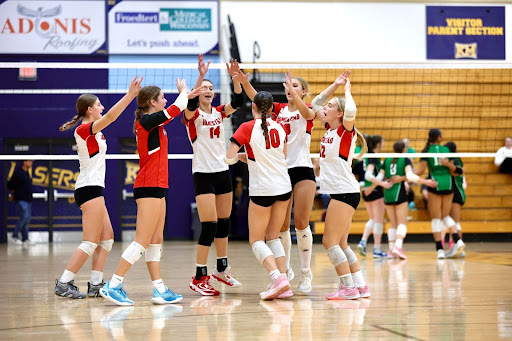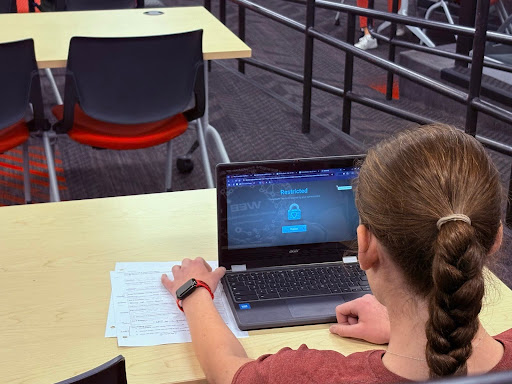Ready, set, study
High school students at Homestead prepare for the upcoming AP exams starting May 4, 2015.

Jordan Ellerbrock, Junior, prepares for her AP English Language and Composition and AP Micro-Economics exams by reading over her text book and making notecards.
Advanced placement courses are the key to college acceptance, but also unlock many doors to absurd amounts of pressure and stress on high school students at Homestead. While regular and honors classes come to a close after two full trimesters of rigorous work and testing, the information in AP courses cannot be tossed out the window along with acquired knowledge from other classes because of the spring College Board Advanced Placement Exams, where students’, once again, put their brains to the ultimate test. Certainly, AP classes and exams are wonderful tools to stretch the growing minds of teenagers, but, on the other hand, can cause high schoolers to live an unhealthy lifestyle for the duration of the full course.
Sarah McCarthy, senior, has undergone the pressure of 10 AP courses over her high school career. “I study about 12 hours per exam, which means I tend to lose sleep,” McCarthy said. Although she is only taking three tests out of the five AP classes she took this year, she will still be studying an estimated 36 hours for her exams, while she, along with every other student taking these exams, is still responsible for her current school work. ”It can be hard to stay on top of other class work, but teachers are cognizant that we have a lot on our plates during AP weeks, so it’s usually not that bad,” McCarthy said.
Since AP courses are taught at a collegiate level to high school students, many students become overwhelmed, and feel as though they are missing out on extra curriculars and the social, fun aspects of high school due to the extra demand for study time. “It’s really important to spend the extra time studying for these exams because of the college credit you can get and money you could save. I takes up a lot of time, and in many instances, needing to study has prevented me from participating in some social events at Homestead,” Ellie Trau, junior who will be taking two AP tests this coming May, said.
No matter the sweat and tears, AP exams are a beneficial tool for the aspiring minds of Homestead’s students. “My favorite part about the AP curriculum is seeing my students challenging themselves, and then succeed. I love the depth of the learning, and how these classes have encouraged such incredible learning opportunities,” Mrs. Anna Mae Grimm, AP Human Geography teacher, said.
Close to half of the 100 Homestead students surveyed said that they take AP exams solely to put on their college applications. “By performing well in AP courses, students in some high schools can offset poor grades they received in other classes, or they can raise their overall GPA above a 4.0, helping them be more competitive for honors such as valedictorian or scholarships,” Maria Magher, writer for Synonym, said.
Over the course of the next two and a half weeks, students at Homestead will begin studying for some of the most rigorous testing of their high school careers. While some students have a game plan in action, many students, especially the teens taking their first batch of AP exams, do not even know where to begin studying. Mrs. Jill Cook, AP English Language teacher, and Mr. Scott Heibler, AP Environmental Science teacher, both recommended the prep website learnerator.com, where students can answer sample multiple choice questions as a study tactic to get ready.
“I get ready for exams by studying together with people in my class and feeding off each other’s information,” Daniel Zvi, junior who has taken three AP courses, said. Allie Petersen, senior, added, “I always go in groups to study and review my notes from class.”

Hi! I am a senior at Homestead, and have been in Highlander Publications since my freshman year. I am on the Homestead varsity swim team, president of...









